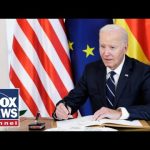In a dramatic turn of events that has left many analysts pondering the future of the Middle East, recent U.S. military strikes have reportedly dealt a significant blow to Iran’s nuclear program. Following a swift series of engagements lasting over 12 days, there are claims that the Iranian nuclear capacities have been set back by 20 months. The former U.S. Secretary of State, Condoleezza Rice, voiced her concerns regarding the early reports that leaked sensitive intelligence, labeling them as irresponsible. Such leaks could undermine the potential benefits of these military actions that have seemingly crippled Iran’s aggressive aspirations.
The Iranian foreign minister has been making headlines recently with statements that contradict the rhetoric from high-ranking officials in Tehran, including the Grand Ayatollah. He has openly admitted that considerable damage has occurred to their nuclear facilities. Such candid declarations are rare and signify a shift in the internal dynamics of Iranian politics. The minister acknowledged that while the damage is indeed serious, the process of allowing international inspectors to assess the situation will be determined by the Supreme National Security Council. This could signify a broader debate within Iran regarding transparency and accountability on the global stage.
As the dust settles, analysis suggests that the strike has not only diminished Iran’s nuclear capabilities but may also change the political landscape in the region. With Iranian leadership floundering—evidenced by newly emerging fracturing statements among their ranks—questions arise about whether this is the beginning of a more modern approach to diplomacy, or just the crack in the façade of a beleaguered regime. Observers note that the minister’s shift suggests a recognition of the changing dynamics in the Middle East, in which traditional bravado is losing its potency.
The various military maneuvers have also sparked conversations about the effectiveness and precision of U.S. operations. Details of how the strikes were coordinated continue to emerge, painting a picture of a meticulously planned operation. Various military officials have recounted the emotional moments when soldiers returned home, with their families waiting with tears and flags in hand, illustrating the human side of warfare that often gets overshadowed in the headlines. The responses from military leadership have not only praised the efforts of those involved but have also highlighted the intricate intelligence that led to these successful strikes.
However, amidst all this, questions prevail regarding the future. Will Iran emerge as a new, non-threatening entity or simply a wounded tiger? The recent intelligence operations allowed for crucial adjustments to be made just before the strikes, hinting at the ability of U.S. and allied forces to remain a step ahead of Iran’s advancements. The ongoing conversation regarding the extent of damage to critical installations continues, while former President Trump warns that should Iran attempt to resume their nuclear ambitions, the U.S. will not hesitate to strike again. With rising tensions in the region, the spotlight now shifts to how America, alongside its allies, will navigate the waters of potential nuclear proliferation not just from Iran, but possibly from nations like China and North Korea, which have shown an affinity for alliances that undermine global security.
In summary, the unfolding situation remains precarious, with the potential for drastic changes in international relations. The response from Iran indicates both vulnerability and a desperate grasp for power, while the U.S. and its allies must remain vigilant, ready to counter any future provocations. The world watches closely as history continues to write itself in ink that could very well influence future generations.




